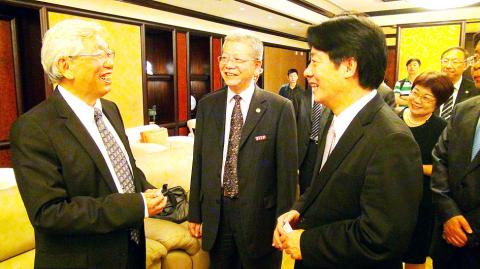Greater Tainan Mayor William Lai (賴清德) yesterday caused jitters among an audience of Chinese politicians and academics with talk about Taiwanese independence and the politically sensitive Tiananmen Square student movement on the second day of his trip to China.
Lai, a member of the Democratic Progressive Party (DPP), made his remarks at a Fudan University discussion session in Shanghai.
Regarding cross-strait exchanges, Lai said that since the Taiwanese consciousness of independence preceded the establishment of the DPP, getting rid of the “Taiwan independence clause” in its party charter would not make the society’s call for independence disappear.

Photo: CNA
According to Greater Tainan Department of Information and International Relations Director and delegation member Chao Ching-hui (趙卿惠), Lai spoke in response to a Chinese professor’s comment on what the professor described as the stalled cross-strait relationship.
Fudan University professor Jiang Yihua (姜義華) reportedly blamed the DPP’s independence platform for the alleged stall, saying that despite cross-strait exchanges over the past years, this particular problem has been little recognized and should now be faced squarely.
Lai said that the DPP’s Taiwan independence clause and its Resolution on Taiwan’s Future are part of the trajectory of the development of Taiwan’s history.
“Taiwanese independence is a cause held by the DPP, which completely respects Taiwanese people’s self-determination in terms of procedure. It has enjoyed a clear consensus in Taiwan, as [former president] Chen Shui-bian (陳水扁) was elected as president on the party’s platform,” Lai said.
“It is important to understand whether the DPP made the cause of independence arise in society, or whether it was society’s call for independence that brought the DPP into existence. Removing the DPP’s Taiwanese independence party platform would not do away with Taiwan’s call for independence,” he said.
Lai said that no problem could be solved before China understands this historical trajectory and he called on the two sides to seek common ground, but also treasure their differences through understanding and reconciliation.
The mayor also mentioned the 1989 Tiananmen Square student movement.
“Fudan University students answered to the cause of the student movement that took place after the death of [reformist Chinese Communist Party] secretary-general Hu Yaobang (胡耀邦) in 1989. And there were more than 400 professors who signed the petition urging the government to recognize the student movement as a patriotic movement,” he said.
The issue of whether Beijing would change its no-contact policy toward the DPP has again come to the forefront amid Lai’s first visit to China on Friday.
Separately yesterday, Beijing reiterated its opposition to Taiwanese independence, but said that it welcomes exchanges with people from all quarters of Taiwan — provided they support advancing cross-strait ties.
The Chinese government maintains a “clear and consistent” policy toward the DPP and stands firmly against Taiwanese independence, China’s Taiwan Affairs Office spokesperson Fan Liqing (范麗青) said when asked about whether Beijing has begun to engage with the DPP.
“We welcome anyone as long as he or she favors, supports and participates in the peaceful development of cross-strait relations, no matter what he or she has advocated in the past,” she said.
Additional reporting by CNA

The combined effect of the monsoon, the outer rim of Typhoon Fengshen and a low-pressure system is expected to bring significant rainfall this week to various parts of the nation, the Central Weather Administration (CWA) said. The heaviest rain is expected to occur today and tomorrow, with torrential rain expected in Keelung’s north coast, Yilan and the mountainous regions of Taipei and New Taipei City, the CWA said. Rivers could rise rapidly, and residents should stay away from riverbanks and avoid going to the mountains or engaging in water activities, it said. Scattered showers are expected today in central and

COOPERATION: Taiwan is aligning closely with US strategic objectives on various matters, including China’s rare earths restrictions, the Ministry of Foreign Affairs said Taiwan could deal with China’s tightened export controls on rare earth metals by turning to “urban mining,” a researcher said yesterday. Rare earth metals, which are used in semiconductors and other electronic components, could be recovered from industrial or electronic waste to reduce reliance on imports, National Cheng Kung University Department of Resources Engineering professor Lee Cheng-han (李政翰) said. Despite their name, rare earth elements are not actually rare — their abundance in the Earth’s crust is relatively high, but they are dispersed, making extraction and refining energy-intensive and environmentally damaging, he said, adding that many countries have opted to

FORCED LABOR: A US court listed three Taiwanese and nine firms based in Taiwan in its indictment, with eight of the companies registered at the same address Nine companies registered in Taiwan, as well as three Taiwanese, on Tuesday were named by the US Department of the Treasury’s Office of Foreign Assets Control (OFAC) as Specially Designated Nationals (SDNs) as a result of a US federal court indictment. The indictment unsealed at the federal court in Brooklyn, New York, said that Chen Zhi (陳志), a dual Cambodian-British national, is being indicted for fraud conspiracy, money laundering and overseeing Prince Holding Group’s forced-labor scam camps in Cambodia. At its peak, the company allegedly made US$30 million per day, court documents showed. The US government has seized Chen’s noncustodial wallet, which contains

SUPPLY CHAIN: Taiwan’s advantages in the drone industry include rapid production capacity that is independent of Chinese-made parts, the economic ministry said The Executive Yuan yesterday approved plans to invest NT$44.2 billion (US$1.44 billion) into domestic production of uncrewed aerial vehicles over the next six years, bringing Taiwan’s output value to more than NT$40 billion by 2030 and making the nation Asia’s democratic hub for the drone supply chain. The proposed budget has NT$33.8 billion in new allocations and NT$10.43 billion in existing funds, the Ministry of Economic Affairs said. Under the new development program, the public sector would purchase nearly 100,000 drones, of which 50,898 would be for civil and government use, while 48,750 would be for national defense, it said. The Ministry of